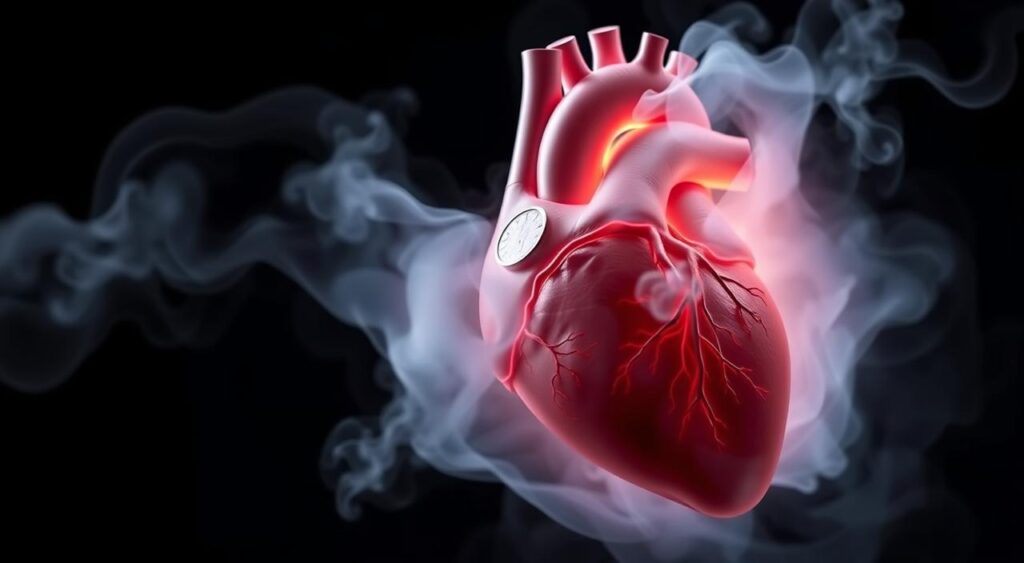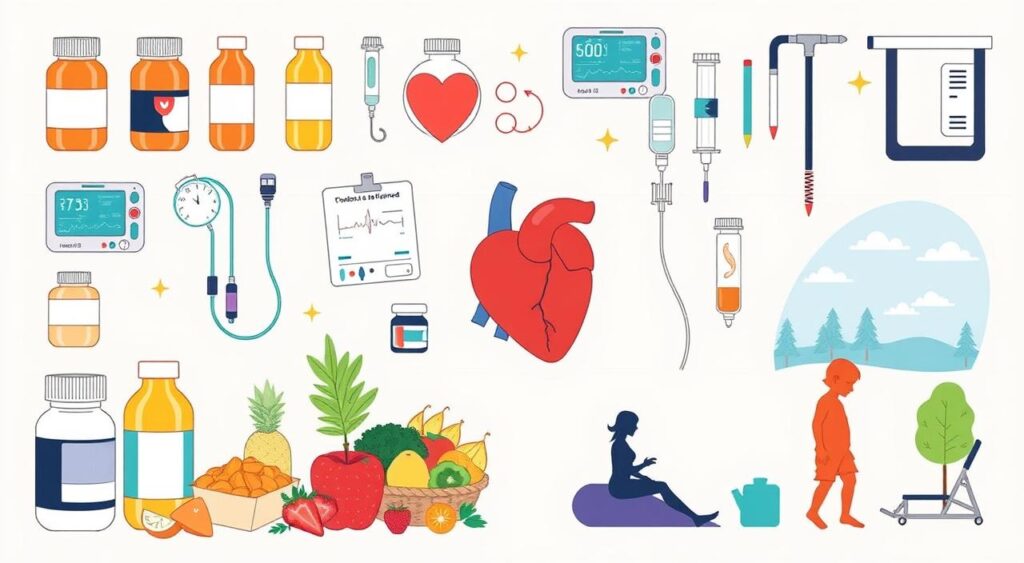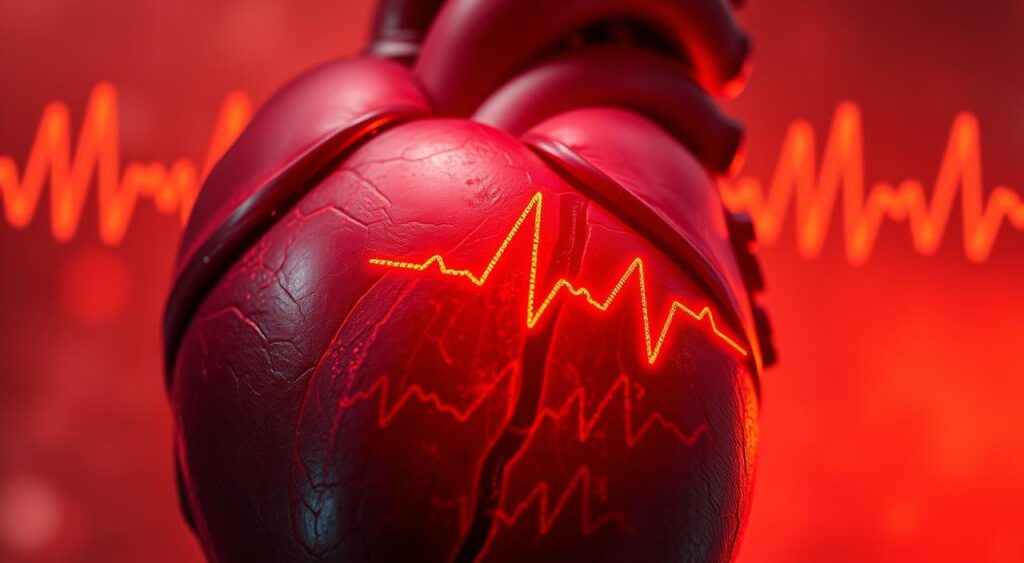Congestive heart failure is a serious heart condition issue worldwide. This shows how common and serious this disease is, making it crucial for everyone to know about it.
This condition happens when the heart muscle gets weak or stiff. It can’t pump blood well, leading to symptoms like shortness of breath and fatigue. This guide will help you understand congestive heart failure better. It aims to help you manage the condition and improve your life.

Key Takeaways
- Congestive heart failure is a chronic cardiac condition that affects the heart’s ability to efficiently pump blood throughout the body.
- It can lead to a range of debilitating symptoms, including shortness of breath, fatigue, and fluid buildup.
- Understanding the underlying causes, such as medical conditions and lifestyle factors, is crucial for effective management and treatment.
- Early diagnosis and a comprehensive treatment plan, including both medical interventions and lifestyle modifications, can help individuals with congestive heart failure improve their quality of life.
- Regular monitoring, ongoing support, and proactive self-care strategies are essential for those living with this chronic condition.
What is Congestive Heart Failure
Congestive heart failure, or CHF, is a serious condition where the heart can’t pump blood well. This leads to fluid buildup, causing fluid buildup, shortness of breath, and fatigue. It’s important to understand how the heart works and the different types of heart failure to manage it well.
Understanding Heart Function
The heart is a vital organ that pumps blood all over the body. It has four chambers: the right atrium, right ventricle, left atrium, and left ventricle. The right side pumps blood to the lungs, and the left side sends it to the rest of the body.
Types of Heart Failure
Heart failure comes in two main types: systolic and diastolic. Systolic heart failure happens when the heart muscle weakens. Diastolic heart failure occurs when the heart muscle stiffens.
Impact on Daily Life
Congestive heart failure can greatly affect daily life. The fluid buildup, shortness of breath, and fatigue make simple tasks hard. People with CHF may also have trouble sleeping, eat less, and feel their quality of life decrease.
| Symptom | Description |
|---|---|
| Fluid Buildup | Excess fluid accumulation in the lungs, legs, and other tissues, leading to swelling and discomfort. |
| Shortness of Breath | Difficulty breathing, especially during physical activity or when lying down. |
| Fatigue | Extreme tiredness and lack of energy, even after rest. |
Common Signs and Symptoms of Heart Failure
Congestive heart failure is a serious condition where the heart can’t pump blood well. It shows through various symptoms that mean the heart is struggling. Knowing these signs is key for catching it early and getting help fast.
Swollen legs are a common sign. Fluid buildup happens when the heart can’t move blood right. This makes the legs swell and feel heavy.
Irregular heartbeat, or arrhythmia, is another sign. The heart’s electrical signals get mixed up. This can make the heart beat too fast, too slow, or irregularly, affecting its work.
People with heart failure often have shortness of breath. This happens when fluid builds up in the lungs. It makes it hard to breathe deeply, especially when moving or lying down.
| Symptom | Description |
|---|---|
| Swollen legs | Fluid buildup in the lower extremities, causing them to swell and feel heavy. |
| Irregular heartbeat | Abnormal electrical impulses leading to a rapid, slow, or erratic heart rhythm. |
| Shortness of breath | Difficulty taking deep breaths, especially during physical activity or while lying flat. |
It’s important to know these symptoms and get help right away if you notice them. Early treatment is vital for managing heart failure and keeping you healthy.
“Recognizing the signs and symptoms of heart failure is the first step towards better managing this chronic condition.”
Risk Factors and Underlying Causes
It’s important to know what can lead to congestive heart failure. This includes pre-existing conditions, lifestyle choices, and genetics. These factors can greatly affect the heart’s health.
Medical Conditions Leading to Heart Failure
Conditions like heart disease, high blood pressure, diabetes, and obesity raise the risk of heart failure. These conditions put extra stress on the heart, making it harder to work well.
Lifestyle-Related Risk Factors
- Smoking and drinking too much alcohol
- Being inactive and not exercising
- Eating a diet full of bad fats, salt, and processed foods
These lifestyle choices can lead to heart problems and increase the chance of heart failure.
Genetic Predisposition
Genetics also play a part in heart failure risk. A family history of heart disease or certain genetic traits can raise your risk. Knowing your genetic background is key.
| Risk Factor | Description | Impact on Heart Health |
|---|---|---|
| Hypertension | High blood pressure | Puts additional strain on the heart, increasing the risk of heart failure |
| Coronary Artery Disease | Blockage or damage to the heart’s arteries | Can lead to reduced blood flow and heart attacks, contributing to heart failure |
| Diabetes | Chronic condition affecting blood sugar levels | Increases the risk of cardiovascular complications, including heart failure |
| Obesity | Excessive body weight | Puts additional strain on the heart, leading to increased risk of heart disease and failure |
“Understanding and addressing the root causes of heart failure is crucial for effective management and prevention of this condition.”
How Doctors Diagnose Cardiac Conditions
Doctors use many steps to find out if you have a heart problem. They do a full check-up, listen to your heart, and use special tests. This helps them see how well your heart is working and your overall health.
The first step is a physical examination. They listen to your heart and lungs for any unusual sounds. They also check your belly and arms for fluid, which can mean heart failure.
Next, they look at your medical history. They ask about your past health, family history, and lifestyle. This helps them understand your risk for heart problems.
To really check your heart, doctors might do several diagnostic tests. These include:
- Echocardiogram: A non-invasive ultrasound that looks at your heart’s structure and how well it pumps, including the ejection fraction.
- Electrocardiogram (ECG or EKG): This test shows the heart’s electrical activity, helping spot problems or irregular rhythms.
- Stress test: This checks how your heart works when you’re active, giving clues about your cardiac condition.
- Cardiac catheterization: A more detailed test that lets doctors see your heart’s blood vessels and find blockages or other issues.
By using what they learn from these steps, doctors can find out what’s wrong with your heart. Then, they can make a plan just for you to help fix it.
Understanding Ejection Fraction and Heart Performance
Ejection fraction is key to checking how well the heart pumps blood. It shows what percent of blood the left ventricle can push out with each beat. Knowing this is vital for spotting and tracking heart disease.
Normal vs. Abnormal Ejection Fraction
A normal ejection fraction is between 50% and 70%. This means the heart pumps blood well. But, if it drops below 40%, it signals the heart isn’t working right, a sign of heart failure.
People with low ejection fraction might feel short of breath, tired, or have extra fluid in their body. Those with a normal ejection fraction might have different heart failure reasons, like problems with the heart’s relaxation.
Measuring Heart Function
Doctors use tests to check ejection fraction, like:
- Echocardiogram: This ultrasound test shows the heart’s size, shape, and how well it pumps.
- Cardiac MRI: It gives detailed heart structure and function info, including ejection fraction measurements.
- Nuclear stress test: This test uses a tiny bit of radioactive material to track blood flow through the heart.
By looking at ejection fraction and other heart measures, doctors can create a good treatment plan. This helps manage heart disease and boost a person’s life quality.
Medical Treatments and Medications
Congestive heart failure needs a mix of treatments. Lifestyle changes and prevention are key. But, medicines also play a big role in managing symptoms and improving heart function for those with congestive heart failure.
Ace inhibitors are a main type of medicine for this condition. They work by blocking a key enzyme, which lowers blood pressure and eases heart work. This helps relax blood vessels and reduce fluid, improving symptoms and slowing disease progress.
- Examples of ace inhibitors include lisinopril, enalapril, and captopril.
- These drugs have been shown to reduce hospital stays and improve survival rates in heart failure patients.
Other common medicines for congestive heart failure include:
- Beta-blockers, which slow the heart rate and help the heart pump better
- Diuretics, which cut down fluid buildup and lower blood pressure
- Anticoagulants, which stop blood clots that can harm the heart
The right mix of medicines depends on the patient’s symptoms, heart failure causes, and how severe it is. Doctors and patients work together to adjust treatments for the best results.

Medical treatments and medicines are vital for managing congestive heart failure. But, they work best with lifestyle changes and support from healthcare teams. By following their doctor’s advice, patients can manage their condition and live better.
Lifestyle Changes and Management Strategies
Managing congestive heart failure needs more than just medicine. Lifestyle changes and management strategies are key. They help improve well-being and reduce issues like fluid buildup and fatigue.
Diet and Exercise Recommendations
Eating heart-healthy is vital for those with congestive heart failure. It means less sodium, more nutrients, and the right amount of calories. Also, low-impact exercises like walking can strengthen the heart and improve function, even with fluid buildup.
Monitoring Fluid Intake
Watching how much fluid you drink is very important. Too much fluid can harm the heart. It’s best to limit fluid and watch your weight closely. Sudden weight gain can mean fluid buildup.
Daily Health Tracking
Tracking your health daily can help you manage congestive heart failure better. It involves monitoring symptoms, vital signs, and any changes in weight, energy, or overall health.
| Lifestyle Recommendation | Benefits |
|---|---|
| Sodium-restricted diet | Helps reduce fluid buildup and strain on the heart |
| Regular low-impact exercise | Improves cardiovascular function and overall fitness |
| Fluid intake monitoring | Prevents excessive fluid buildup and related complications |
| Daily health tracking | Enables early detection of changes and better self-management |
By making these lifestyle changes, people with congestive heart failure can manage their condition better. This improves their life quality and may lower the risk of fluid buildup, fatigue, and other problems.
Prevention Strategies and Heart Health
Keeping your heart healthy is key. There are many ways to lower your risk of heart disease or cardiac conditions. By following these steps, you can protect your heart and avoid congestive heart failure later on.
Living a heart-healthy lifestyle is a great start. This means exercising regularly, eating well, and staying at a healthy weight. Also, seeing your doctor often can catch problems early. This way, you can get help right away.
- Engage in regular physical activity, such as brisk walking, swimming, or cycling, for at least 30 minutes per day, most days of the week.
- Eat a diet that is low in saturated and trans fats, cholesterol, and sodium, and high in fiber, vitamins, and minerals.
- Maintain a healthy body weight through a balanced diet and regular exercise.
- Quit smoking and limit alcohol consumption, as these habits can significantly increase the risk of heart disease.
- Manage any underlying medical conditions, such as high blood pressure, diabetes, or high cholesterol, through appropriate treatment and lifestyle modifications.
| Preventive Measure | Impact on Heart Health |
|---|---|
| Regular exercise | Improves cardiovascular fitness, lowers blood pressure, and reduces the risk of heart disease. |
| Healthy diet | Helps maintain a healthy weight, reduces cholesterol levels, and supports overall heart function. |
| Stress management | Helps lower blood pressure and reduces the risk of heart-related issues. |
| Regular check-ups | Allows for early detection and management of any underlying cardiac conditions or risk factors. |
By focusing on these prevention strategies, you can control your heart health. This can greatly lower your risk of heart disease or cardiac condition in the future.
Living with Congestive Heart Failure
Coping with congestive heart failure (CHF) in daily life can be tough. But, with the right strategies and support, patients can keep their quality of life high. It’s key to manage symptoms like shortness of breath and fatigue to do everyday tasks and activities.
Managing Daily Activities
Changing your daily routine and focusing on rest can help save energy and ease heart strain. Here are some tips:
- Pace yourself and break tasks into smaller, manageable steps.
- Prioritize essential activities and delegate or reschedule less urgent tasks.
- Incorporate regular rest breaks and avoid overexertion.
- Organize your living space to minimize unnecessary movement and effort.
Support Systems and Resources
Having a strong support network and using available resources can greatly help manage life with CHF. Check out these options:
- Connect with a cardiac rehabilitation program to receive personalized guidance and support.
- Engage with local support groups or online communities to share experiences and learn from others living with CHF.
- Work closely with your healthcare team, including your cardiologist, nurse, and nutritionist, to develop a comprehensive care plan.
- Utilize home health services, such as nursing care or meal delivery, to assist with daily tasks and manage your condition.
Living with congestive heart failure means being adaptable and putting your health first. By using practical strategies and resources, you can face challenges and live an active, fulfilling life.
“Taking care of yourself is the best thing you can do to manage congestive heart failure and improve your quality of life.”
When to Seek Emergency Care
Congestive heart failure is a serious condition that needs quick medical help. Many symptoms can be managed with medicine and lifestyle changes. But, there are warning signs that mean you need emergency care right away. Knowing these signs can help save lives.
Recognizing Life-Threatening Symptoms
If you or a loved one with congestive heart failure has any of these symptoms, call for emergency help right away:
- Sudden and persistent irregular heartbeat or palpitations
- Severe, unexplained swollen legs or abdomen
- Rapid, labored breathing or shortness of breath, even at rest
- Chest pain or discomfort that doesn’t go away with rest
- Fainting or dizziness that comes on suddenly
These symptoms can mean a serious problem like a heart attack or fluid buildup in the lungs. Quick medical help is key to prevent worse problems.
Importance of Calling 911
If you see any of these emergency signs, call 911 or your local emergency services right away. Time is crucial for heart-related emergencies. Waiting or trying to drive to the hospital can be very risky.
The emergency team can provide quick help and take the patient to the nearest hospital. Getting fast, professional care is very important for heart failure emergencies.

| Symptom | Description | Urgency |
|---|---|---|
| Irregular heartbeat | Sudden, persistent palpitations or fluttering sensation in the chest | Immediate emergency care |
| Swollen legs | Rapid, unexplained swelling in the legs or abdomen | Immediate emergency care |
| Shortness of breath | Difficulty breathing, even at rest | Immediate emergency care |
| Chest pain | Persistent, unexplained discomfort in the chest | Immediate emergency care |
| Fainting or dizziness | Sudden loss of consciousness or severe lightheadedness | Immediate emergency care |
Knowing and acting on these warning signs is crucial for managing heart failure. Don’t wait to get medical help if you or a loved one shows these symptoms.
Conclusion
Congestive heart failure is a complex condition that needs careful management. But, with the right approach, people can live well despite it. Understanding the causes, recognizing symptoms, and getting medical help early are key steps.
This article has covered congestive heart failure in detail. We’ve looked at its effects on daily life and the treatment options. It’s important for people to work with their doctors to create a plan that fits their needs.
Making lifestyle changes can greatly help those with congestive heart failure. Eating right, exercising regularly, and watching fluid intake are important. Also, having a support system and knowing when to seek emergency care can make a big difference.
FAQ
Q: What is congestive heart failure?
A: Congestive heart failure is a long-term heart condition. The heart can’t pump blood well, causing fluid buildup. This leads to symptoms like shortness of breath, feeling tired, and swollen legs.
Q: What are the main causes of congestive heart failure?
A: Many things can cause congestive heart failure. Heart disease, high blood pressure, and diabetes are common causes. Poor diet, not exercising, and smoking can also raise your risk.
Q: What are the common signs and symptoms of congestive heart failure?
A: Signs include shortness of breath, feeling very tired, and swollen legs and ankles. You might also have an irregular heartbeat. Fluid in the lungs makes it hard to breathe.
Q: How is congestive heart failure diagnosed?
A: Doctors use tests to find congestive heart failure. They check your health history and do physical exams. Tests like echocardiograms measure heart function.
Q: What are the treatment options for congestive heart failure?
A: Treatment includes medicines like ACE inhibitors and diuretics. Changing your lifestyle is also key. Sometimes, surgery is needed. The goal is to manage symptoms and improve heart function.
Q: How can I prevent or manage congestive heart failure?
A: A healthy lifestyle can help prevent or manage it. Eat well, exercise regularly, and manage health conditions. Watch your fluid intake and work with your doctor to create a treatment plan.
